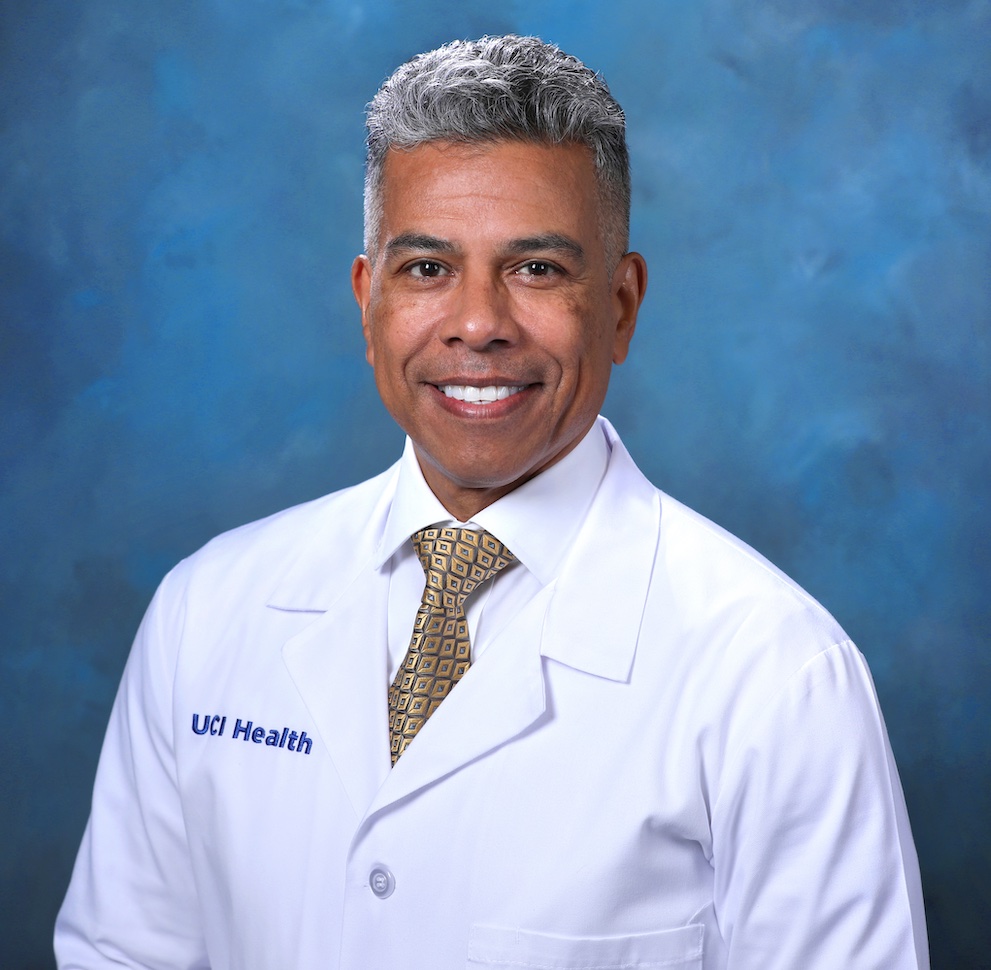Federico E. Vaca Faculty Spotlight Interview
Professor and Executive Vice Chair, Emergency Medicine
School of Medicine

How did you become interested in transportation?
My father was an auto mechanic; my mom was a nurse. I grew up in and around cars and healthcare. Although I love vehicles and how they work, I pursued medicine. Specifically, motor vehicle and traffic safety research.
I completed my emergency medicine residency here at UC Irvine and also completed a Medical Fellowship at the U.S. DOT’s National Highway Traffic Safety Administration in Washington, DC. As a young emergency medicine faculty member at UCI, I cared for a lot of trauma injured patients from motor vehicles, cycling, and motorcycle crashes. As a result, I was driven to go beyond the doors of the emergency department and into communities to see what I could do to help prevent serious injuries.
My earliest transportation and traffic safety work started with examining the needs of child passenger/occupant safety among Latino children and their families that would end up in our emergency department. This led to broader work in collaborative relationships in Latino communities focused on prevention education here in Southern California. The community based approach and bilingual nature of working to enhance health literacy in traffic safety and injury prevention changed my whole career.
What drew you to UCI or ITS Irvine?
I was here at UC Irvine as a faculty member in the School of Medicine for about 13 years. In that time, my research focused on motor vehicle occupant protection, teen driver behavior, health disparities, and crash-injury epidemiology. In each of these areas, I worked with the Latino community at large.
I was recruited away in 2009 to the Yale School of Medicine and I continued my research in the Northeast. In mid-2022, I was recruited back to UCI and on my arrival, I immediately wanted to make a connection with the prestigious ITS-Irvine. Thankfully the leadership was interested in learning more about my transportation and traffic safety work. I felt like there was an immediate spark. I was asked to speak at their research symposium and help with their very first Transportation Safety Colloquium which was a great success.
If you could give incoming students one piece of career advice, what would it be?
I would say to take a dive deep into really understanding the scope of transportation and what transportation science offers across the spectrum. Get an understanding of the breadth of transportation science. Transportation is in the foreground, middle ground, and background of our lives; it's central to living.
What are your research interests and what types of your projects are you currently working on?
The majority of my work over time has been in motor vehicle crash injury epidemiology with more specific sub-areas of investigation including crash injury prevention, young driver behavior, impaired driving, and related health disparities. I have been conducting research and program work in these areas for nearly 25 years.
What do you consider your most significant research finding or accomplishment thus far?
I would say that this would be some of the more recent NIH funded work that my colleagues and I have been examining, including understanding the teen delay in driving licensure phenomena and how this might impact youth and what that could mean for later health, education and employment.
Other notable work deals with what we call RWI and DWI, that is, riding with impaired drivers and driving while impaired. We've all heard a lot about DWI prevention programs for teens and those focused on reducing underage drinking, and those are all incredibly important, but there's less known about this RWI.
We've conducted some large national mixed methods work, looking at trajectories of high school teens when and if they do or do not engage in RWI and DWI, and what that means for their choice in health behaviors as they move forward in life.
What issues in transportation keep you up at night?
Having practiced emergency medicine for 30 years and taking care of thousands of people that have been in motor vehicle crashes, my mind is always thinking about how we bolster and more deeply integrate injury prevention into day-to-day clinical care, even in the emergency department. I’m also always thinking about how we can move the research that has already been done more effectively into the light of translation for prevention activities and programs so that our communities can reap tangible benefits. I also fully realize that there is just so much complexity here but trying to disentangle some of these issues is what intrigues me most about transportation and traffic safety.
Also, the traffic safety world owes so much to vehicle safety engineering. However, the engineering piece is far from done and I believe there is much prevention gain to be had as we continue to merge safety engineering and health behavior together in the traffic safety space. There is a lot of room for innovation here.
Is there someone or something that inspired you to do your work?
My inspiration first came from my parents. My mom was a nurse and had a passion for the well-being of all of her patients and for closely working with physicians to deliver high quality care. My dad taught me so many things about vehicle upkeep and safety. What inspired me beyond that, was my clinical practice in emergency medicine and taking care of my patients.
What is a fun fact about you?
Before high school, I also got into roller speed skating. It was quite competitive. I actually got quite good and competed in the regional championships and won. That was a long time ago.
What is your superpower?
Given the trajectory of my own career and my experiences along the way, I might say that my superpower is effectively mentoring students, young physicians in training, and young faculty. I truly enjoy engaging with students and young faculty and discussing their career development and future plans.